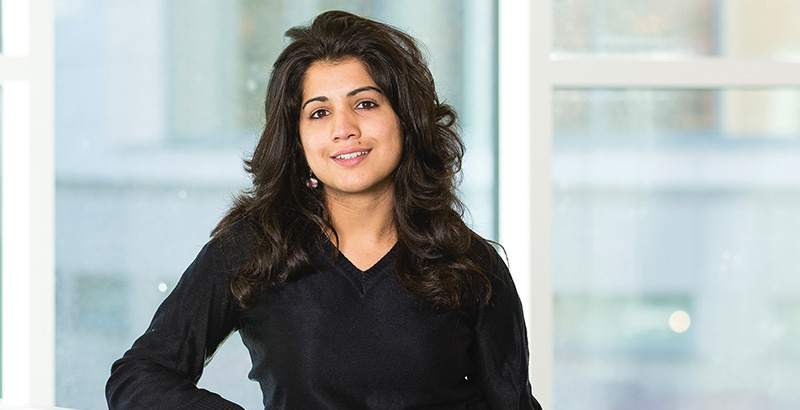Intervju med GU-forskaren Aiysha Varraich om korruption och de globala målen
Just nu pågår en utställning på det Samhällsvetenskapliga biblioteket kring de globala målen och delmålet "Bekämpa korruption och mutor". I samband med detta intervjuade vi Aiysha Varraich, som är doktorand på the Quality of Government Institute (QOG). Här diskuterar hon sin forskning och de globala målen för hållbar utveckling.

Hello Aiysha! Tell us about your research at the Quality of Government Institute.
My main research interests are corruption and clientelism. I investigate how religion in politics affects the vote choice of citizens in the context of developing democracies. I argue that relational aspects of clientelism rooted in religion play a large role in political outcomes.
What is the purpose and main task of the QoG Institute?
The purpose of the QoG Institute is to conduct and promote research on the causes, consequences and nature of Good Governance and the Quality of Government - that is, trustworthy, reliable, impartial, uncorrupted and competent government institutions.
How does corruption affect society from a sustainability perspective?
The United Nations sustainability goals captures a general idea of what we perceive a state should provide in order for a good society to be enabled. This includes the provision of education, quality healthcare, clean water, sanitation as well as climate change. However, if corruption is present in a society, it will have a detrimental affect on all of these aspects. If a citizen must pay a bribe to access healthcare, but cannot afford to do so, then their physical wellbeing is compromised. It will not only affect the individual’s wellbeing, but also the collective wellbeing of society.
What can we do to fight corruption?
At the institutional level, it is through developing context specific policies that target the different types of corruption. One example of such a policy is the provision of whistleblower protection. In the case of corruption taking place at institutional level, e.g. within public procurement, concerned civil servants would not be afraid of reporting the incidence for fear of losing their job. Instead they would be more likely to come forward and report the corrupt act taking place.
Does corruption exist in Sweden? Time and time again Sweden, alongside its Nordic neighbours, are ranked as countries with low levels of corruption. However, that does not result in that there is an absolute absence of the phenomenon in Sweden.
A pertinent example of this took place in 2010. The QoG Institute carried out an EU-wide study and measured the quality of government at the subnational level. We specifically looked at the provision of healthcare, education, and the existence of free media (Charron et al. 2010). We used the case of Västra Götalandsregionen as an example of a region with high quality of government, as measured on the basis of healthcare, free media, law enforcement, local government and absence of corruption (Jonsson and Varraich 2010).
During the writing of this case study, the investigative journalistic program Uppdrag Granskning uncovered the much advertised bribe scandal in the City of Gothenburg. There had been an extensive quid pro quo arrangement that had taken place between civil servants and contractors. It gave us a sense of understanding of how corruption can seep in to a system, when accountability measures are not exercised regularly, and checks and balances are not carried out to their fullest extent. And in this case, where the whistleblower protection was weak.
That said, corruption is not the norm in Swedish society, nor in its provision of public services – it is the exception. Unlike many of its continental Eastern European neighbours, the common Swedish citizen is not affected by corruption. To quote one of those interviewed from the study “there is always room for improvement, even in places like Sweden” (Jonsson and Varraich 2010).
Utställningar på biblioteken
Samhällsvetenskapliga biblioteket, Vasagatan 2 A
Utställning: ”Fredliga och inkluderande samhällen” (mål 16), och delmål 16.5 ”Bekämpa korruption och mutor”.
När: 24 oktober - 24 november.
Ekonomiska biblioteket, Vasagatan
Utställning: "Bekämpa klimatförändringarna" (mål 13).
När: 24 oktober - 24 december.
Globala målen för hållbar utveckling
Globala målen eller de globala målen för hållbar utveckling, är en del av Agenda 2030. Agenda 2030 innehåller de 17 globala målen för hållbar utveckling, som den 25 september 2015 antogs av FN:s generalförsamling i resolution A/RES/70/1, under namnet Transforming our world: the 2030 Agenda for Sustainable Development.